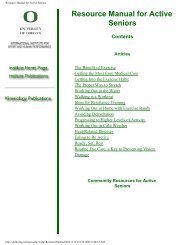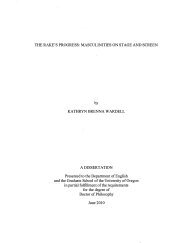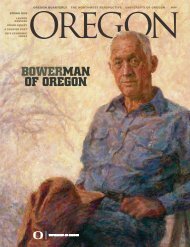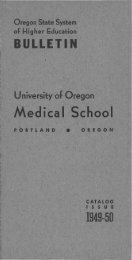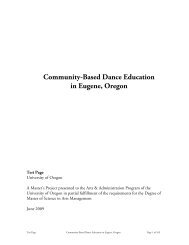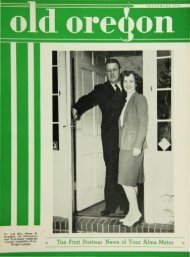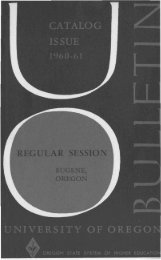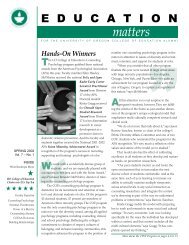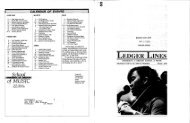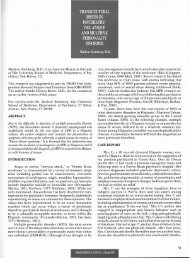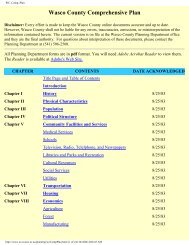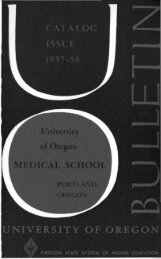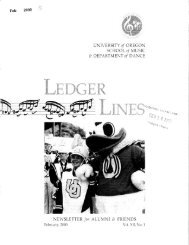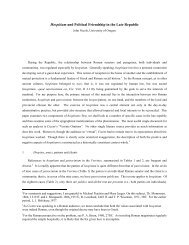~EGULAR SESSION - University of Oregon
~EGULAR SESSION - University of Oregon
~EGULAR SESSION - University of Oregon
Create successful ePaper yourself
Turn your PDF publications into a flip-book with our unique Google optimized e-Paper software.
SCHOOL OF MUSIC 341<br />
Minimum Requirements for Music Teaching. The mmllnum subject requirements<br />
for certification as a teacher <strong>of</strong> music in <strong>Oregon</strong> high schools, established<br />
by the <strong>Oregon</strong> State Department <strong>of</strong> Education, are as follows: for a basic<br />
certificate, granted after four years <strong>of</strong> college work, a basic llorm-42 term hours,<br />
including work in each <strong>of</strong> the following areas: theory, composition, and keyboard<br />
harmony, music literature and history, conducting, analysis, and performance<br />
studies; for a standard certificate, granted after five years <strong>of</strong> college work, a<br />
standard llorm-60 term hours, including the basic-norm requirement.<br />
The norm requirements listed above will be mandatory after July I, 1965.<br />
The minimum subject requirements for students who qualify for certification<br />
before this date are published in the 1962-63 <strong>University</strong> Catalog, page 264.<br />
Honors. See HONORS COLLEGE, pp. 120-123.<br />
Minor for Elementary Teachers. Majors in elementary education may, ill<br />
consultation with advisers in the School <strong>of</strong> Music, arrange a minor in music,<br />
including selected courses in addition to work required for elementary teacher<br />
certification.<br />
Graduate Work. The School <strong>of</strong> Music <strong>of</strong>fers graduate work leading to the<br />
master's degree in the following fields: music theory, composition, performance<br />
(instrumental and vocal), and school music. The following degrees are granted:<br />
Master <strong>of</strong> Arts-historical and theoretical studies, school music.<br />
Master <strong>of</strong> Music-music theory, composition, performance, school music.<br />
Candidates for the Doctor <strong>of</strong> Education degree in the School <strong>of</strong> Education<br />
may choose music education as a field <strong>of</strong> major specialization.<br />
Application for admission to graduate study in the School <strong>of</strong> Music must be<br />
made both to the <strong>University</strong> Director <strong>of</strong> Admissions and to the dean <strong>of</strong> the School<br />
<strong>of</strong> Music. Two copies <strong>of</strong> a transcript <strong>of</strong> the student's previous college work must<br />
be submitted with the application, one to the Director <strong>of</strong> Admissions and one to<br />
the dean.<br />
During faU-term registration week, all entering graduate students in music,<br />
including graduates <strong>of</strong> the <strong>University</strong> <strong>of</strong> <strong>Oregon</strong>, are required to take a series <strong>of</strong><br />
examinations to test the adequacy <strong>of</strong> their preparation for graduate study. Deficiencies<br />
shown by the examinations must be remedied, through the auditing <strong>of</strong><br />
undergraduate courses or by independent study, before the student is admitted<br />
to full graduate standing and candidacy for a graduate degree.<br />
Music<br />
LOWER-DIVISION COURSES<br />
'Mus SO. Basic Piano. 1 hour any term (3 hours maximum credit.)<br />
Classroom instruction for music majors who receive a low rating on a test <strong>of</strong><br />
keyboard pr<strong>of</strong>iciency, and for other students ineligible for piano instruction<br />
at the' level <strong>of</strong> Mus 190.<br />
'Mus 51. Basic Voice. 1 hour any term (3 hours maximum credit).<br />
Classroom instruction for students ineligible for voice instruction at the level<br />
<strong>of</strong> Mus 190.<br />
Mus 121, 122, 123. Music Theory 1. 4 hours each term.<br />
Study <strong>of</strong> diatonic functional triadic harmony, including modulation to related<br />
keys, secondary dominants, two-part counterpoint. Written work correlated<br />
with sight singing, analysis, aural comprehension, and keyboard application.<br />
Chodos, Dieterich, Earls, Maves, Rost.<br />
* No-grade course.



